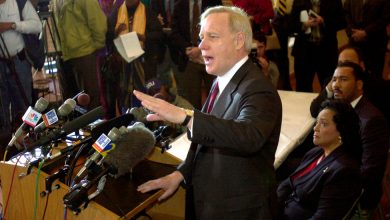Maxwell Describes Childhood Mistreatment in Bid for Lighter Sentence

Ghislaine Maxwell, in a plea for mercy two weeks before she is to be sentenced in her sex-trafficking case, blamed her actions on parental cruelty and on her relationship with Jeffrey Epstein, the disgraced financier whom she was accused of helping recruit and abuse underage girls.
“She had a difficult, traumatic childhood with an overbearing, narcissistic, and demanding father,” her lawyers wrote on Wednesday evening to the Manhattan federal judge who is to impose sentence on June 28.
“It made her vulnerable to Epstein, whom she met right after her father’s death,” the lawyers said. “It is the biggest mistake she made in her life and one that she has not and never will repeat.”
Ms. Maxwell, 60, was found guilty on Dec. 29 after a monthlong trial on five of the six counts she faced. The most serious conviction was for sex-trafficking of minors, which carries a maximum prison sentence of 40 years. Two other counts carry maximum sentences of five and 10 years.
The judge, Alison J. Nathan, ruled in April that she would not sentence Ms. Maxwell on two remaining charges for which she was convicted because they overlapped with conduct covered by other counts. There is no minimum sentence.
In their brief filed in Federal District Court, Ms. Maxwell’s lawyers asked Judge Nathan to impose a sentence below the 20 years recommended by the court’s probation department. They argued that Ms. Maxwell had spent much of her life being victimized by two men, both of whom are now dead.
The story played out in a rarefied world of boarding schools and mansions on two continents.
Ms. Maxwell, the lawyers wrote, became anorexic as a toddler and was so ignored she stood in front of her mother as a 3-year-old to declare, “Mummy, I exist.”
The lawyers accused Ms. Maxwell’s father, the British media magnate Robert Maxwell, who died after falling off his boat in 1991, assailed by mounting debt, of a gothic array of domestic misdeeds, ranging from long absences to cruel quizzes at the dinner table with dressings down for incorrect answers.
Once, after the 13-year-old Ms. Maxwell tacked a poster of a pony on the newly painted wall of her bedroom, the lawyers wrote, Robert Maxwell, outraged, took the hammer and banged it on her hand, leaving it severely bruised and painful for weeks.
The lawyers wrote that their client now faced sentencing because of her association with Mr. Epstein decades ago, in the 1990s and early 2000s.
“The witnesses at trial testified about Ms. Maxwell’s facilitation of Epstein’s abuse,” the lawyers wrote, “but Epstein was always the central figure: Epstein was the mastermind, Epstein was the principal abuser and Epstein orchestrated the crimes for his personal gratification.”
Ms. Maxwell’s arrest in New Hampshire in July 2020 followed years of investigation and litigation that had focused on Mr. Epstein. He was arrested in July 2019 and charged with sexually exploiting and abusing dozens of girls and women at his estate in Palm Beach, Fla., his mansion in Manhattan and other locations.
Mr. Epstein, 66, was found dead in his cell a month later, after he hanged himself with a sheet, the medical examiner ruled. He had been awaiting his own trial on sex-trafficking charges.
In their sentencing brief, Ms. Maxwell’s lawyers argued that prosecutors had turned their attention to her only after the “strong media and public uproar” following Mr. Epstein’s death while in the custody of the Justice Department and the Bureau of Prisons.
“The government faced an urgency to appease the renewed distress of Epstein’s accusers and to repair the tarnished reputations of the D.O.J. and B.O.P.,” the lawyers wrote.
“There would be no trial for Epstein and no public vindication and justice for his accusers,” they said. “The government now had a huge hole to fill: Epstein’s empty chair.”
At Ms. Maxwell’s trial, prosecutors presented a case over 10 days that centered on testimony from four accusers, all now adults.
Two women said Mr. Epstein engaged in sex with them when they were as young as 14. One woman said Ms. Maxwell was sometimes present during the encounters; the other testified that Ms. Maxwell had molested her directly, touching her breasts.
“Maxwell was a sophisticated predator who knew exactly what she was doing,” Alison Moe, an assistant U.S. attorney, told the jury in a closing argument. “She manipulated her victims, and she groomed them for sexual abuse.”
The government is scheduled to file its sentencing recommendation with Judge Nathan next week.
Ms. Maxwell’s lawyers, in their brief, also reiterated long-raised arguments that she had endured extreme conditions after she was denied bail and held in a detention center in Brooklyn. For 22 months, they said, she was locked in an isolation cell, measuring 9-by-7 feet, and monitored constantly by video cameras.
They said her “extraordinary conditions of solitary confinement” justified a “hard-time credit.”
Ms. Maxwell’s lawyers wrote that after Ms. Maxwell’s conviction, she was moved into the jail’s general population, where the Oxford University graduate worked as an orderly, completed several educational courses and “eagerly provided a wide variety of assistance to the women in her unit, including G.E.D. tutoring.”
But while in the general population, the lawyers said, she also was the “target of a credible death threat from a fellow inmate.”
A prisoner in Ms. Maxwell’s housing unit told at least three other inmates that she had been offered money to murder Ms. Maxwell and that she planned to strangle Ms. Maxwell in her sleep, the lawyers wrote. The inmate who made the threat was moved to a different unit, “presumably to protect Ms. Maxwell,” the lawyers said.
The incident could not be independently confirmed and Nicholas Biase, a spokesman for the U.S. attorney’s office, declined to comment on the claim.
“This incident reflects the brutal reality,” the defense lawyers wrote, “that there are numerous prison inmates who would not hesitate to kill Ms. Maxwell — whether for money, fame, or simple ‘street cred.’”



